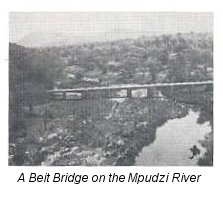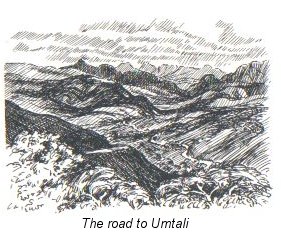In religious activities pride of place went to the Dutch Reformed
Church, with a resident Predikant and regular Nachtmaal occasions. Wagons rolled
up, women with big floppy kappies appeared, a rather flat bell rang, and men
with long beards and stern faces spoke in guttural tongues. When John, a young
Rooinek, ventured into their midst and attempted a few halting words in
Afrikaans, he received a great welcome, much laughter at his mistakes, and many
handshakes.
John married Ann Siebert, a teacher at the School and their daughter
Annabel (Mrs. C. P. Hayter) was horn in 1932.

In February 1929 the new Beit
bridges on the main road were severely tested in a damaging storm of high winds
and torrential rain. All the rivers were raging torrents with the approaches
washed away, and the Mpudzi was 5� over the new bridge and some material was
carried away but the piers stood the strain of the great mass of rushing water.
At Moodie�s Nek a heavy fall of rock and earth completely obliterated the road.
The R.M.S. was held up and Cashel volunteers took the mails to Johannesrust and
carriers took them on over the mountain footpaths to Melsetter, with similar
arrangements for outgoing mails. Heavy rains continued, and the Railways had a
struggle to maintain one service a week instead of the scheduled two: they found
that their two-ton Morris 6-wheeled lorry was the best type for maintaining
regularity of service in bad road and weather conditions, and also used a
4-wheeled Reo Motor lorry.
In April the R.M.S. service was extended to Highlands, and many
farn\ers disposed of the transport which they had previously used to get their
produce in to Melsetter for loading. The lorries left Umtali at 4 a.m. on
Wednesdays and Saturdays and spent two nights in Melsetter, doing the Highlands
trip on the intervening day. This service through the area with the most dairy
cattle and sheep in the district was well patronised: 19 farmers used it, and
some 1 200 lbs cream and 150 lbs butter and other exports were sent on it
weekly.
Great dissatisfaction was expressed when in December the lorry, with no
warning, stopped coming to Highlands, and farmers were stranded with no means of
getting their perishables away. The return lorry left a day earlier than
scheduled, and, although people in the village had a few hours� warning of the
change, mails were disrupted.
The Railways� reason for the discontinuance of
the service was the state of the road and the farmers asked the Roads Department
to repair the bad patches immediately but were told that the road would be a
dry-season one only until the necessary exceptionally heavy expenditure was
authorised for major work when the route of the road was decided.
The sudden and arbitrary change aroused general indignation. It was
felt that if due notice had been given of the changes the public would have been
prepared and, though a certain amount of grumbling might have taken place, would
have acquiesced in the decision. Melsetter people wondered under what rule they
were living, whether that of an elected legislative body, or a despotism
consisting of the Railways and the Post Office.
Soon afterwards a special lorry was sent as far as Thornton, which
managed the journey and returned to town safely, and in due course the regular
service to Highlands was re-introduced.
Captain F. H. Allott with his wife and daughters came from England to
farm in Melsetter on the advice of his cousin Bill Hanmer. From Umtali they
travelled out on a privately-owned lorry, open to the skies and with
hardly any seating accommodation, and what there was was certainly not
comfortable. They left Umtali at six o�clock in the morning and arrived at 8
o�clock at night. The driver, Martin Cronwright, constantly stopped to have a
shot at a buck, and if successful threw the dead beast into the back of the
already overcrowded lorry. Local inhabitants living close to the road were most
hospitable and brought steaming hot cups of sweet coffee.
The Allotts lives for six months at Fairview in an enormous rondavel which
served as bedroom, livingroom and kitchen, and when the Hanmers went on holiday
the Allotts were entrusted with the care of the farm and the job of making a new
road to Heathfield. One night they were wakened by a herdboy saying that the
cattle were bellowing and something was wrong. Ted attached his night-shooting
lamp to his head with its elastic band and took his gun and he and Olive crept
up to the cattle kraal, climbed onto the roof of the shed and lay flat,
listening for the cause of the disturbance. After what seemed hours the cattle,
which had temporarily quietened down, became restless and started to bellow, all
turning to face one way. Ted switched on the lamp and they saw two pairs of eyes
reflected in the light. Lion or leopard? Ted was preparing to aim when at that
moment the elastic band snapped, the lamp fell down, the light went out and they
were plunged in darkness. He couldn�t get it to light again and they didn�t dare
move until sure that the marauders had gone, but when everything was quiet they
came down and returned to the house thoroughly disappointed. Some sceptics
laughed at the idea of lion, but Erasmus, a real old-Timer, examined the spoor
and stated most emphatically that they were lion.

After leaving Fairview the Allotts camped on Welgelegen for a month, where
they loved the river and the close proximity to the Chimanimanis and were very
tempted to buy it, but two events finally decided them not to: the blind fly
which attacked the horses perpetually and worried them nearly to death; and then
A.C.F. with cattle dying all around, and when they found a dead beast lying in
the drinking water furrow they thought it was time to quit.
They bought Belmont and Belmont Valley from Andries and Michael Kok and
went in for cattle and horses, intending to breed horses and sell the progeny,
but, in spite of being offered good prices, when the time came to sell they
couldn�t bear to part as they had become so attached to all of them, and at one
time they had 22 horses.
They rode everywhere and thought nothing of riding 20 or more miles to
buy cattle. Once returning from such an expedition they got benighted: it was
too dark to go further in fairly thick bush with the newly-acquired herd so they
put up a rough fence round the cattle and got a fire going, off-saddled and lay
down on the ground with the saddles as pillows, and got a few hours� sleep until
the moon rose at 2 a.m., shining as bright as day, and they carried on
home.
A Riding Club was started, and on Sunday mornings there was the sound
of galloping up Belmont drive, and about 18 young people appeared on horse-back.
Ted erected jumps on a flat stretch of grassland, and there everyone had lots of
fun.
In 1929 G. E. McLeod offered to supply the township with electricity,
and his proposal was enthusiastically received by the V.M.B. The matter was
considered throughout the year, but in December the whole scheme fell through,
as also did Lethbridge�s fresh scheme the following year.
~~~000~~~